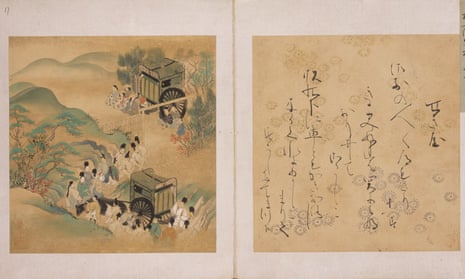The oldest written copy of part of the 11th-century Japanese epic The Tale of Genji, has been found in the home of a Tokyo family with ancestral ties to a feudal lord.
Seen as the world’s first novel, The Tale of Genji was completed around 1010 by a woman of the 11th-century Heian court of Japan, who was later given the name Murasaki Shikibu by scholars. It centres on the fortunes – amorous and political – of Genji, the son of an emperor. The original manuscript of the story no longer exists, with the oldest versions of the story believed to have been transcribed by the poet Teika, who died in 1241.
Until now, just four chapters of the 54-chapter story are confirmed to be Teika’s transcriptions, but now a fifth chapter, which depicts Genji’s encounter with the girl who becomes his wife, Murasaki, has also been identified as Teika’s. The manuscript had been kept in an oblong chest in a storeroom at the Tokyo home of Motofuyu Okochi, a descendant of the former feudal lord of the Mikawa-Yoshida Domain in Aichi Prefecture, the Japan Times reported.
Experts at Reizeike Shiguretei Bunko, a foundation for the preservation of cultural heritage, have now confirmed its authenticity, with the handwriting of the text, and the cover of the manuscript, identical to other Teika manuscripts. The foundation said although the newly-found manuscript “mostly” matches the common version of the story, there are some grammatical differences.
According to the Asahi Shimbun, family records show the manuscript has been in the hands of the Okochi family since 1743, when it was handed down from the Kuroda family of the Fukuoka feudal domain.
Kyoto University professor Junko Yamamoto told the paper that previous research on the chapter has relied on manuscripts of The Tale of Genji that were completed about 250 years later. “It is very significant that this discovery of the manuscript edited by Teika will be available for researchers,” she said.

Comments (…)
Sign in or create your Guardian account to join the discussion